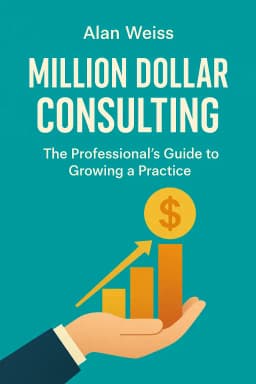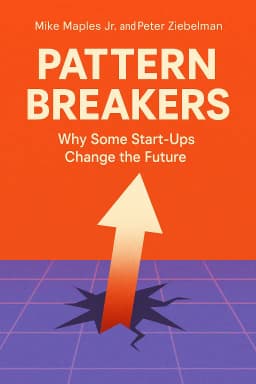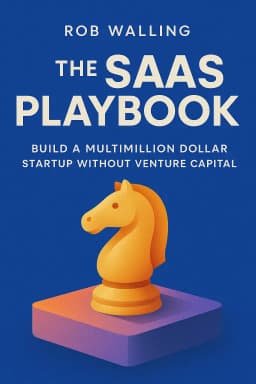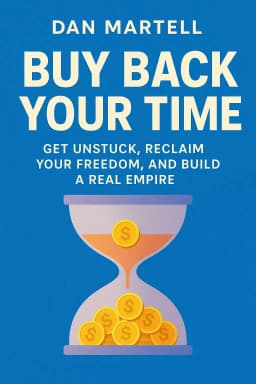
The Crocodile's Playbook
Golden Hook & Introduction
SECTION
Mark: The world's biggest e-commerce company isn't Amazon. And its founder, a former English teacher who knew nothing about computers, once made Jeff Bezos sit in the audience and scribble notes like a student. How did that happen? Michelle: Wait, Jeff Bezos taking notes on who? That sounds like a scene from an alternate universe. We think of Amazon as the undisputed king of e-commerce. Mark: In the West, yes. But globally, the story is much, much bigger. And it’s the story at the heart of Alibaba's World by Porter Erisman. Michelle: Right, and Erisman wasn't just a journalist looking in. He was one of the first Westerners inside the company, their Vice President of international marketing for eight years. He saw it all, from the near-bankruptcies to the global domination. Mark: Exactly. He had a front-row seat to the chaos and the genius. The book was even named a Best Business Book of the year by the Wall Street Journal, because it tells a story most of the West completely missed for over a decade. It’s a story that begins with everyone, especially the American tech giants, massively underestimating this scrappy little company from Hangzhou. Michelle: A company led by a man who called himself a "blind man riding on the back of a blind tiger." I love that. It doesn't exactly scream 'future billionaire.' Mark: It really doesn't. And that's where the story gets interesting. It's a classic underdog tale, but the playbook they used to win is anything but conventional.
The Underdog's Playbook: How a 'Crocodile in the Yangtze' Fought Global Sharks
SECTION
Mark: The perfect place to start is with that image of Jeff Bezos taking notes in 2006. Jack Ma is on stage, charming this audience of Silicon Valley elites, and he says, "I’m 100 percent ‘made in China.’ I know nothing about technology. One of the reasons why Alibaba survived is because I know nothing about computers." Michelle: That's such a disarming thing to say. It’s the opposite of the typical tech CEO bravado. He’s basically saying his ignorance was an asset. Mark: Precisely. Because it forced him to focus on customers, not code. And this philosophy became their core weapon in the war against eBay, which was the undisputed global champion at the time. When eBay entered China, everyone assumed it was game over. They had the money, the brand, the technology. Michelle: They were the shark in the ocean. Mark: Exactly. And Jack Ma famously said, "eBay may be a shark in the ocean, but I am a crocodile in the Yangtze River. If we fight in the ocean, we lose—but if we fight in the river, we win." He decided to fight in the river, on his home turf. Michelle: Okay, so what does fighting like a crocodile even look like in business terms? Mark: It looks like guerilla warfare. For instance, eBay came into China and immediately signed exclusive advertising deals with all the major web portals, effectively blocking Alibaba's new consumer site, Taobao, from the mainstream internet. They tried to starve them of oxygen. Michelle: That’s a classic big-company move. Just buy up all the ad space. So how did Taobao respond? Mark: They couldn't afford the big portals, so they went to the thousands of tiny, independent websites and forums all over China. They plastered their ads everywhere else. It was messy, it was grassroots, but it meant that wherever the average Chinese internet user went, they saw Taobao. EBay was only visible on the "official" front pages, but Taobao was woven into the fabric of the Chinese web. Michelle: That's brilliant. They turned a weakness—a small budget—into a strength by being more creative and widespread. But ads are one thing. You still need to get people to actually use the site. Mark: And this is where they dropped the bomb. At a huge press conference, Jack Ma announced that Taobao would be free for users for the next three years. No listing fees, no commissions. Free. Michelle: Okay, but 'free' really isn't a business model. How were they planning to survive? Weren't they just burning cash they didn't have? Mark: That's exactly what eBay thought! Their PR chief famously said, "Free is not a business model." They were dismissive, almost arrogant. But they completely misread the Chinese market. At the time, very few people in China shopped online. The market needed to be educated and nurtured. By making it free, Jack Ma wasn't just competing with eBay; he was building the entire market from scratch. He was getting millions of small entrepreneurs to try e-commerce for the first time. Michelle: So eBay was trying to monetize a market that barely existed, while Alibaba was focused on creating the market in the first place. The crocodile was building its own river. Mark: Perfectly put. They were playing a long game. They knew that once they had the ecosystem—millions of buyers and sellers who trusted the platform—they could figure out how to make money later. EBay, the shark, was looking for its next meal. Alibaba, the crocodile, was terraforming the entire landscape.
The Culture Clash: 'Asian Wisdom' vs. 'Western Operations'
SECTION
Michelle: It sounds like they knew their local market perfectly. But the book shows that when they tried to go global, or even just hire Western experts, it was a total disaster. Mark: An absolute, unmitigated disaster. In 2000, flush with cash from investors like Goldman Sachs, the leadership team decided they needed to be a "global" company. So they hired a team of "foreign experts"—MBAs from top schools, veterans from multinational corporations—and set up a fancy international headquarters in Hong Kong and a tech hub in Silicon Valley. Michelle: That sounds like the standard playbook for a company wanting to scale up. What went wrong? Mark: Everything. The book describes it as creating a "two-headed monster." The Hangzhou headquarters, where the founding team was, was all about scrappy, 24/7 work ethic. The author, Porter Erisman, tells this incredible story of walking into the office and finding a room full of bunk beds with engineers sleeping in them. They lived and breathed the company. Michelle: And the Silicon Valley office? Mark: The Silicon Valley office operated on a 9-to-5 schedule. The teams were 15 hours apart, spoke different languages, and had completely different cultures. The US team would send requests to China at the end of their day, and by the time the Chinese team responded, the US office was closed. Projects stalled, communication broke down, and resentment grew. The author tells a story about a new hire in Hangzhou who was so confused about the lack of structure that he just sat at his desk and pretended to work for a whole week because he didn't know who his boss was. Michelle: That sounds like a nightmare version of remote work gone wrong. It's the classic headquarters vs. regional office fight, but on a global, billion-dollar scale. Mark: It was. And the author, Erisman, had seen this movie before. He shares a personal story in the book that’s just a perfect microcosm of this whole problem. Before Alibaba, he worked for a multinational in Beijing, tasked with launching a children's candy line. He had a brilliant marketing strategy, a perfect plan on paper. Michelle: Let me guess, it failed spectacularly. Mark: Completely. Because he focused only on the strategy and ignored the people. He didn't build relationships with his local Chinese colleagues. He didn't understand what he calls the "informal structure" of the company—the web of relationships and trust that actually gets things done. He learned that in China, strategy without relationships is useless. Michelle: Wow, so he learned that lesson the hard way before joining Alibaba. He must have seen the red flags with the Silicon Valley experiment from a mile away. Mark: He did. He saw the "foreign experts" in Hong Kong dismissing the Hangzhou team's ideas. He saw them trying to impose a rigid, Western corporate structure on a fluid, chaotic, but passionate startup culture. The company was burning through millions of dollars a month and was on the brink of collapse. Michelle: So what happened? How did they fix it? Mark: Jack Ma had to make one of the hardest decisions of his life. He flew to the US and personally laid off the entire Silicon Valley staff. They called it the "Back to China" strategy. It was a painful, humiliating retreat. The book quotes Jack Ma on the phone late that night, asking Erisman, "Am I a bad person?" It was a brutal lesson: you can't just import a business model or a management style. Culture isn't a feature you can just add. It has to be the foundation.
Building Trust in a Trustless World: The Genius of AliPay and Taobao
SECTION
Mark: Exactly. And that deep understanding of local dynamics, learned through painful failure, is what led to their single greatest innovation. It wasn't a flashy product, but a solution to an invisible problem that Western companies completely missed: the problem of trust. Michelle: What do you mean by that? Mark: In the early 2000s in China, the idea of sending money to a stranger on the internet for a product you've never seen was insane. There was no widespread credit card usage, no consumer protection laws you could rely on, and a general culture of skepticism. You couldn't just build a website and expect people to start buying things. Michelle: Right, the basic plumbing of trust that we take for granted in Western e-commerce just wasn't there. Mark: It didn't exist. And this is where eBay's model, which worked perfectly in the US, completely fell apart in China. They charged sellers a fee to list items. But Chinese sellers thought, "Why would I pay you a fee to list my product on a site where no one is buying anything because no one trusts anyone?" It was a chicken-and-egg problem. Michelle: And Taobao's "free for three years" strategy broke that cycle. Mark: It shattered it. But even with free listings, you still had the payment problem. How do you get the buyer to send money and the seller to send the product without either one getting ripped off? Jack Ma's solution was AliPay. And it's crucial to understand what AliPay was at the beginning. Michelle: It wasn't just a payment processor like PayPal? Mark: Not at all. It was an escrow service. A neutral third party. The concept was simple but revolutionary. As a buyer, you would pay your money to AliPay, not the seller. AliPay would then notify the seller, "We have the money, you can ship the product." The seller ships it, and only when the buyer confirms they received the item and it's what they ordered, does AliPay release the money to the seller. Michelle: That's genius. It's not a payment system, it's a trust system. It's a digital handshake that protects both sides. And eBay, with its global model, just assumed that trust was a given? Mark: They completely missed it. They were a shark looking for fish in the ocean. They didn't realize the river was toxic and needed to be purified first. AliPay was the water purifier. And Jack Ma knew how risky it was. He was essentially creating a private bank without a license. He later said he told his team, "If someone has to go to jail for this, I will go." Michelle: Wow. That's conviction. He was willing to risk prison to solve this one fundamental problem. Mark: Because he knew it was the key to everything. Once trust was established, the ecosystem could flourish. And it did. This foundation of trust is what eventually allowed for the creation of things like "Taobao Villages," where entire rural towns lifted themselves out of poverty by selling goods online. It empowered millions of people who had been left behind by the traditional economy. Michelle: It’s incredible. They didn't just build a company; they built the infrastructure for a new kind of economy. And it all came from understanding a deep-seated cultural need that their global competitors were blind to.
Synthesis & Takeaways
SECTION
Mark: And that really brings all three ideas together. It wasn't about having better technology or more money. Alibaba won because they played a completely different game. They used scrappy, underdog guerilla tactics. They embraced their local culture instead of trying to copy a Western model. And most importantly, they solved the fundamental human problem of trust that was holding the entire market back. Michelle: It makes you wonder what "invisible" problems exist in our own industries that everyone is just ignoring because they're stuck in the old way of thinking. The book is a powerful argument for looking at what people actually need, not just what your competitors are doing. Mark: It really is. The whole journey is a testament to resilience. As Jack Ma said, and it's one of the most powerful lessons from the book, "Today is tough, tomorrow is tougher, but the day after tomorrow is beautiful. Most people die tomorrow night." Michelle: And they don't get to see the sunshine. Alibaba survived tomorrow night. Mark: They absolutely did. And in doing so, they didn't just build a company; they built a new world for millions of entrepreneurs. Michelle: It’s a powerful reminder. We'd love to hear what you think. What's the biggest 'invisible problem' you see in your world that's just waiting for a creative solution? Find us on our socials and let us know. We read everything. Mark: This is Aibrary, signing off.









